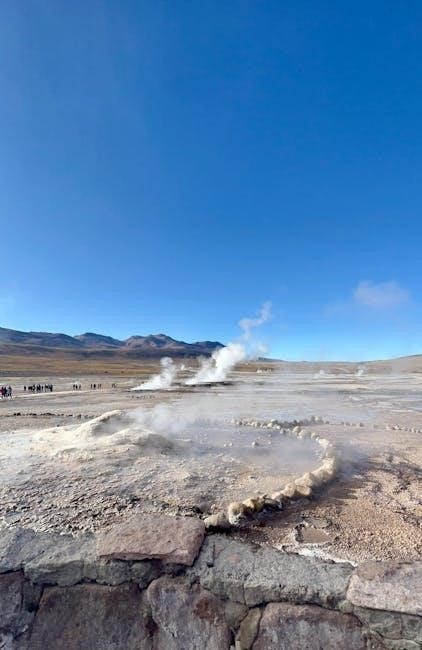Spinoza’s concept of God‚ known as Deus sive Natura‚ revolutionized philosophy by equating God with nature‚ rejecting a personal deity. This idea‚ central to his philosophy‚ emphasizes God as inherent in all existence‚ challenging traditional religious frameworks and fostering a rational understanding of the divine.
1.1. Overview of Spinoza’s Philosophy
Spinoza’s philosophy centers on rationalism‚ rejecting supernaturalism and embracing a deterministic universe. His concept of Deus sive Natura (God or Nature) posits God as the inherent‚ immanent cause of all existence‚ not a personal deity. This metaphysical framework‚ detailed in his Ethica‚ emphasizes substance monism‚ where God and nature are one‚ governed by reason and natural laws‚ profoundly influencing modern philosophical and scientific thought.
1.2. The Importance of Understanding Deus sive Natura
Understanding Deus sive Natura is pivotal as it challenges traditional religious views‚ offering a rational‚ unified perspective of God and nature. This concept‚ central to Spinoza’s philosophy‚ emphasizes God as an inherent‚ immanent force in the universe‚ rather than a separate entity. Grasping this idea is essential for comprehending Spinoza’s metaphysical framework and its profound influence on both philosophical thought and modern scientific interpretations‚ as seen in Einstein’s admiration for his work.

Deus Sive Natura: Spinoza’s Definition of God
Spinoza defines God as Deus sive Natura‚ equating the divine with nature. This concept rejects a personal deity‚ instead positing God as the unified‚ self-caused substance of existence.
2.1. The Equivalence of God and Nature
Spinoza’s concept of Deus sive Natura posits that God and nature are identical‚ forming a single‚ self-caused substance. This equivalence rejects a personal deity‚ instead envisioning God as inherent in all existence. Nature‚ in this view‚ is not created by God but is God itself‚ operating under necessary laws. This idea challenges traditional religious views by eliminating the separation between the divine and the natural world‚ emphasizing a unified‚ rational understanding of existence.
2.2. Implications of a Non-Personal God
Spinoza’s non-personal God rejects the idea of a deity with intentions or emotions‚ emphasizing instead a rational‚ deterministic universe governed by natural laws. This perspective eliminates divine intervention‚ shifting focus from prayer and worship to understanding nature through reason. It aligns with Einstein’s view of a rational cosmos‚ fostering a philosophical and scientific worldview that prioritizes logic over supernatural explanations.

Historical Context of Spinoza’s Ideas
Spinoza’s ideas emerged in the 17th-century Dutch context‚ influenced by Cartesian rationalism and Jewish traditions‚ facing opposition from religious authorities‚ leading to his excommunication and shaping his philosophy.
3.1. Influence of Cartesian Rationalism
Spinoza’s philosophy was deeply shaped by Cartesian rationalism‚ which emphasized reason and logical structure. Descartes’ method of clear and distinct ideas influenced Spinoza’s geometric approach in Ethics‚ where he presented his metaphysics axiomatically. However‚ Spinoza diverged by rejecting Cartesian dualism‚ instead proposing a monistic view of reality‚ integrating mind and matter within his concept of Deus sive Natura.
3.2. Opposition to Traditional Religious Views
Spinoza’s concept of God opposed traditional religious views by rejecting a personal‚ transcendent deity. His idea of Deus sive Natura implied God as an inherent‚ impersonal force within nature‚ challenging the notion of a separate creator. This led to his excommunication and criticism‚ as his philosophy was seen as heretical‚ yet it influenced modern thought‚ including Einstein‚ who embraced Spinoza’s pantheistic vision.
Ethical and Philosophical Implications
Spinoza’s concept of God as Deus sive Natura emphasizes reason over revelation‚ fostering an ethical framework centered on understanding existence. His philosophy rejects supernaturalism‚ advocating for a life guided by necessity and rational insight‚ profoundly influencing modern thought on morality and the human condition.
4.1. The Role of Reason in Understanding God
Spinoza’s philosophy underscores reason as the primary tool for understanding God‚ emphasizing rational insight over supernatural revelation. By grasping the natural order and necessary causality‚ humans align their knowledge with God’s essence‚ which is inherently tied to the universe’s structure and laws‚ reflecting a divine necessity and eternity.
4.2. Spinoza’s Rejection of Supernaturalism
Spinoza dismissed supernaturalism‚ rejecting the idea of a personal God who intervenes in the world through miracles. He argued that God‚ as identical with nature‚ operates through necessary natural laws‚ not arbitrary divine will. This view eliminates the need for supernatural explanations‚ grounding all phenomena in the inherent order of the universe‚ which is governed by reason and causality.

Metaphysical Foundations of Spinoza’s God
Spinoza’s metaphysics posits a single‚ infinite substance‚ equating God with nature. This monistic view asserts that all existence is a unified‚ necessary expression of God‚ governed by inherent laws rather than personal will.
5.1. Substance Monism and the Unity of Existence
Spinoza’s metaphysics centers on substance monism‚ positing a single‚ infinite substance—God or Nature—as the foundation of all existence. This substance‚ governed by necessary laws‚ unites mind and matter‚ rejecting dualism. Attributes like thought and extension express God’s nature‚ emphasizing unity and rejecting a transcendent deity. This framework underpins Spinoza’s vision of a cohesive‚ rational universe‚ where God is not separate but inherent in all being.
5.2. Attributes of God: Thought and Extension
Spinoza defines God’s attributes as essential expressions of His nature‚ with thought and extension being primary. Thought represents mental aspects‚ while extension embodies physical reality. These attributes are distinct yet inseparable‚ reflecting the unity of God. They enable humans to comprehend God’s infinite essence through reason‚ aligning with Spinoza’s rationalist approach and emphasizing the interconnectedness of all existence within a single‚ divine framework.

Einstein’s Reference to Spinoza’s God
Einstein often expressed belief in Spinoza’s concept of God‚ describing it as an impersonal‚ universal force inherent in nature‚ resonating with his own view of the cosmos.
6.1. Einstein’s Belief in Spinoza’s Deus
Einstein openly embraced Spinoza’s concept of God‚ describing it as an impersonal‚ universal force embedded in nature. He often stated‚ “I believe in Spinoza’s God‚” emphasizing a harmonious‚ deterministic universe governed by rational laws. This belief aligned with his scientific worldview‚ rejecting a supernatural deity in favor of a God inherent in the natural order‚ reflecting Spinoza’s Deus sive Natura.
6.2. The Relevance of Spinoza’s Ideas in Modern Science
Spinoza’s concept of Deus sive Natura deeply resonates with modern scientific thought‚ particularly in its emphasis on determinism and the unity of existence. Einstein‚ inspired by Spinoza‚ saw the universe as a rational‚ law-governed system‚ rejecting supernaturalism. This alignment with scientific principles underscores the enduring relevance of Spinoza’s philosophy in contemporary debates about the nature of reality and the cosmos.
Accessing the Complete Text of “El Dios de Spinoza”
The complete text of El Dios de Spinoza is easily accessible in PDF format through various online platforms‚ ensuring reliable sources for scholarly research and philosophical exploration.
7.1. Availability of PDF Versions Online
PDF versions of El Dios de Spinoza are readily available online through academic databases‚ libraries‚ and platforms like Google Scholar. These sources provide free or subscription-based access‚ ensuring easy downloading for research or personal study. The formats are compatible with various devices‚ making Spinoza’s seminal work accessible to a global audience interested in philosophy and theology.
7.2. Reliable Sources for Download
Reputable platforms like Google Scholar‚ Academia.edu‚ and university libraries offer authentic PDF downloads of El Dios de Spinoza. These sources ensure access to complete‚ high-quality texts‚ ideal for scholarly research or personal reading. Users can rely on these platforms for accurate and unaltered versions of Spinoza’s work‚ facilitating deeper engagement with his philosophical ideas.
The Modern Relevance of Spinoza’s Philosophy
Spinoza’s ideas remain influential‚ inspiring contemporary thought in philosophy‚ science‚ and secularism. His emphasis on reason and unity of existence resonates in modern debates about religion and rationality.
8.1. Spinoza’s Influence on Contemporary Thought
Spinoza’s philosophy profoundly impacts contemporary thought‚ influencing metaphysics‚ rationalism‚ and secularism. His ideas on the mind-body problem and the unity of existence resonate in modern debates about science‚ religion‚ and environmental ethics‚ inspiring holistic views of nature and human existence while challenging traditional dualisms.
8.2. The Timelessness of His Ideas
Spinoza’s ideas remain timeless due to their universal relevance and profound insights into existence. His concept of Deus sive Natura continues to inspire philosophical and scientific inquiry‚ emphasizing reason‚ secularism‚ and the harmony of nature. By rejecting a personal God and advocating for a self-sustaining universe‚ Spinoza’s philosophy bridges centuries‚ offering a unified understanding of reality that resonates in modern debates about science‚ religion‚ and human existence.

Critique and Controversy Surrounding Spinoza’s God
Spinoza’s concept of Deus sive Natura faced opposition from religious communities‚ who viewed it as atheistic. His rejection of a personal God and emphasis on nature as divine sparked lasting controversy‚ challenging traditional theological frameworks.
9.1. Historical Criticism and Misinterpretation
Spinoza’s concept of Deus sive Natura faced intense criticism‚ with many labeling it atheistic. Religious groups opposed his rejection of a personal God‚ viewing it as a denial of divine providence. His ideas were often misinterpreted‚ particularly his pantheistic views‚ which clashed with traditional religious frameworks. Critics argued that his deterministic nature diminished the role of God‚ leading to widespread theological controversy and intellectual debates.
9.2. Debates Among Philosophers and Theologians
Spinoza’s concept of Deus sive Natura sparked intense debates‚ with philosophers praising its rationality and theologians criticizing its perceived atheism. Some viewed his pantheistic views as groundbreaking‚ offering a unified understanding of existence‚ while others saw it as diminishing God’s role. Theologians argued it undermined divine authority‚ while philosophers appreciated its alignment with scientific thought‚ influencing later thinkers like Einstein‚ who embraced Spinoza’s vision of a rational‚ impersonal deity embedded in nature.
Cultural and Religious Impact
Spinoza’s ideas profoundly influenced Jewish and Christian thought‚ challenging traditional views of God and religion. His rationalist approach inspired Enlightenment thinkers‚ bridging philosophy and science‚ while sparking debates on divine authority and human spirituality across cultures.
10.1. Spinoza’s Influence on Jewish and Christian Thought
Spinoza’s philosophy significantly impacted Jewish and Christian thought by challenging traditional religious frameworks. His rationalist approach and concept of Deus sive Natura encouraged a shift from supernaturalism to a more naturalistic understanding of God. This influenced Jewish thought by emphasizing reason over revelation and impacted Christian theology by fostering Enlightenment ideals‚ while also sparking debates on divine authority and human spirituality.
10.2. The Role of Spinoza in the Enlightenment
Spinoza’s rationalist ideas‚ particularly his concept of Deus sive Natura‚ played a pivotal role in the Enlightenment. His emphasis on reason over revelation and rejection of supernaturalism inspired secular and scientific thought. This philosophy resonated with Enlightenment thinkers‚ fostering critical inquiry and shaping modern philosophical discourse.

Key Themes in Spinoza’s “El Dios” Text
Spinoza’s “El Dios” text explores the unity of God and nature‚ emphasizing reason’s primacy over revelation. It challenges traditional views‚ advocating for a rational understanding of the divine.
11.1. The Unity of God and Nature
Spinoza’s concept of Deus sive Natura posits that God and nature are identical‚ forming a single‚ indivisible substance. This unity rejects a personal deity‚ instead embedding God within all existence. Nature‚ as God’s manifestation‚ operates through necessity‚ not design. This view dissolves the distinction between creator and creation‚ emphasizing a deterministic‚ rational universe. It challenges traditional religious frameworks‚ aligning with Einstein’s perception of a harmonious‚ law-governed cosmos.
11.2. The Primacy of Reason Over Revelation
Spinoza emphasizes reason as the supreme tool for understanding God‚ rejecting revelation as a source of truth. He argues that rational inquiry reveals God’s essence‚ embedded in nature’s laws. This approach minimizes religious dogma‚ advocating for a logical‚ deterministic universe. By prioritizing reason‚ Spinoza empowers humans to comprehend God through natural order‚ aligning with Einstein’s belief in a harmonious‚ intelligible cosmos governed by necessity‚ not divine whim.
Spinoza’s vision of God as Deus sive Natura reshaped philosophy‚ emphasizing reason over revelation. His ideas remain influential‚ offering a rational‚ harmonious view of existence‚ embraced by thinkers like Einstein‚ and continue to inspire contemporary debates on theology and science.
12.1. Summary of Spinoza’s Vision of God
Spinoza’s vision of God‚ or Deus sive Natura‚ posits God as the inherent substance of nature‚ rejecting a personal deity. This concept‚ central to his philosophy‚ unites the divine with the natural world‚ emphasizing reason and immanence. By equating God with nature‚ Spinoza challenges traditional religious frameworks‚ offering a harmonious‚ rational understanding of existence that has profoundly influenced modern thought and science‚ as seen in Einstein’s admiration for his ideas.
12.2. Final Thoughts on the Significance of His Philosophy
Spinoza’s philosophy remains profoundly influential‚ offering a rational‚ unified vision of existence. His concept of Deus sive Natura bridges philosophy and science‚ inspiring thinkers like Einstein. By rejecting supernaturalism and emphasizing reason‚ Spinoza’s ideas continue to shape modern thought‚ fostering a deeper understanding of God‚ nature‚ and humanity’s place within the universe‚ ensuring his legacy as a pivotal figure in intellectual history.
